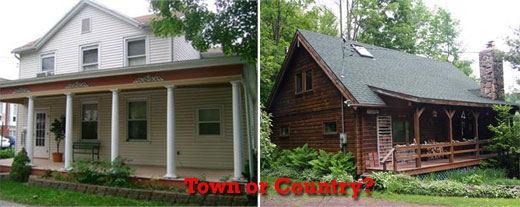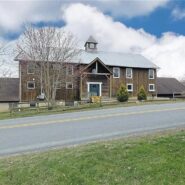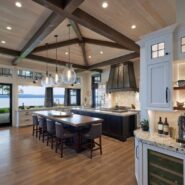The Weekenders: What Kind of Upstater Are You?
Kim McGalliard | June 15, 2012
First thing to consider when you start thinking about getting a place upstate: How different do you want your life upstate to be from your life in the city or suburbs? Do you want it to be totally different or just more spacious with better/different views? When we started looking for a place upstate, we had several things going for us: we had already spent considerable time in the Catskills, either doing weekend trips hiking, or visiting friends who had a place near Woodstock, so we knew many different areas. We also both had a fairly clear idea what we wanted. Since I grew up in a rural area I knew I could only live in one extreme or the other: total city (which we have in Brooklyn) or total country.
For us it was a great step to start with a “do want/don’t want” list. Sometimes a list like this can end up being a “deal breaker” list, but the important thing is to articulate your vision so you have some ideas about what you want, even if those ideas are based on stuff you just imagine to be true.
Below are some questions that might help starting your list. Remember that you probably don’t have to settle for one extreme or the other – you could end up somewhere in between. As was true for us, it often ends up being all about finding the house that you were meant to buy. You just need to figure out where to start looking for it.
This seems to be a big one for most people. Can you live without the ability to walk to a deli or cafe for coffee or milk? Do you want to have a view that is free of signs of other humans? Do you mind driving 45 minutes to get anywhere – not just to get to your place, but to get other places while you are there? Can you stand quiet (no noise) and darkness? Seriously, for some people, real quiet and darkness is unnerving. If so, don’t even think about moving to the real country; a village or small town place might better suit you. It’s quiet and dark here in the country.
2. Close or Far?
For some people, two hours is the magic number, for others it’s anything under three. But keep in mind that in broker speak, “two hours from NYC” often means two hours from the George Washington bridge. If you’re coming from Brooklyn, add 30 minutes to an hour, and plan on doing some serious damage to your car if you take the third-world expressway otherwise known as the BQE, parts of which are just one big pothole. Generally, the closer you are to the city, the more expensive things are, and the higher the taxes. It’s also harder (not impossible) to find rural or country-feeling properties closer to the city. Some questions to ask yourself: Are you willing to travel the extra 30 mins to an hour to get cheaper, bigger or more private? Do you want friends/family to visit? Will you be going up every weekend or just long weekends and holidays? I knew that if we were coming up every weekend, three hours of driving was my absolute limit. That pretty much ruled out anything in Delaware county, a place we were familiar with that seemed to have a lot of cool looking properties.
You can definitely find a lot of big houses upstate – at all price points, and in all states of repair (or disrepair). It’s important to think about what you’ll be doing both now and in the future with your place. Do you plan on only using it for weekends and holidays or do you plan at some point to make it a full-time home? Do you have or are you planning on having kids? Do you want to have a lot of visitors who need to or like to have their own space, or do you mind people crashing on the couch (or in a tent outside when the weather is nice?). How do you feel about cleaning? Do you have extra furniture lying around, or do you have a budget and time to furnish and decorate your house? Do you have a lot of stuff in storage? The bigger the house, the more social you can be with friends and family from out of town, but the more the you will have to pay to heat it in the winter (see next item) and the more work you’ll have cleaning and maintaining it. We originally thought we’d get a smallish place – two or maybe three bedrooms. We ended up with six. If you do end up getting a big house, one tip: walkie-talkies.
4. Summer House or Four Seasons?
If you are thinking that you’ll use the house in winter as well as summer (Skiing! Sledding! Snowshoeing!) your budget will need to include money to heat your house when you aren’t there. We kept ours at 50 degrees when we weren’t there, and we closed off one part of the house so we didn’t have to heat it. Thankfully, this winter was a fairly mild one, but we still ended up paying thousands of dollars to our oil company – way more than I expected. In many small towns and rural areas upstate, cheaper (for right now) natural gas is not available so you’re stuck with oil or propane for heat. As of the end of March, heating oil is $4.11/ gallon, propane is $2.87/ gallon just to give you an idea. And it’s cheaper now than it was this winter. Electric heat used to be an undesirable way to heat a house, but as oil and gas prices go up, electric is getting comparably more affordable. You can use wood heat, but only when you’re home. Alternative options are out there – solar and wind – but they aren’t entirely dependable. Finding or creating an energy efficient home is an important issue if you want a four season place.
5. High or Low Maintenance?
This is partly related to lawn and garden work and partly what your house is made of. Do you like gardening, weeding, pruning and mowing? Depending on the size of your lawn (if you have one) it can cost anywhere from $40 to $120 per mow, which in a hot, wet summer may need to be done every week. We’ve been going back on forth about getting our own mower. Flowering plants and trees are fantastic in the spring and summer, but they all require pruning and maintenance to keep them healthy and in control. It doesn’t have to be an every weekend chore, and if you’re like me, you find this type of work enjoyable. But if you have a lot of plants, and they haven’t been maintained, the time it takes to care for them or money to pay someone to do it can add up.
All homes, no matter what they are made of, need exterior maintenance. That white clapboard farm house looks really nice, but needs to be painted every 10 to 15 years, depending on where you are. Brick and stone need repointing. Shingled houses are pretty low maintenance but need painting or staining as well. Many homes that have a lot of shade or have a north-facing side are prone to mold and mildew that needs to be cleaned off every few years. The list goes on, but it’s really a matter of how much of the work you are willing/able to do, or how much money you have to pay to have someone do it for you. This is weighing heavily on my mind these days because we have lots of exterior trim that desperately needs painting. We’re hiring somebody to do the high stuff – eaves and trim around the roof. We’re trying to do the lower painting ourselves. Sixteen windows plus decorative trim to scrape, caulk and paint is overwhelming, but we’ve decided to take the “one weekend at a time” approach: do small sections that seem reasonable to do in a weekend and finish each day at six pm in time for cocktail hour by the creek.
6. Hip or Hick?
Do you need your weekly culture fix – films, music, art and fancy food, or do you plan on using your country place to get away from all of that? There are definitely towns and areas throughout the Catskills and Hudson valley that abound with cultural happenings – after all, there are tons of city transplants that call upstate home. There are also towns and areas where culture consists of pancake breakfasts, 4-H livestock auctions, guns, hunting and antique car shows. Whichever type you prefer, or if like me, you like both, the other one is still within reach; it’s just a matter of how close or how far you want to be to either. And truthfully, hick seems to be pretty hip these days.
7. Old or New?
I’ve always wanted to live in an old house, however, older homes can be fraught with maintenance problems, and in general are much less efficient than newer ones unless they’ve had significant upgrades done. New homes generally have fewer problems, but keep in mind that many homes built in the 80’s or 90’s are coming up on their 25 – 30 year anniversary – the anniversary when many primary systems (that are expensive to replace) like heating, roof, insulation, appliances, windows are approaching the end of their life. If you don’t want to deal with REAL old, you can buy one of these old style but new homes from Catskill farms. Or, you can buy land and build your own place from a kit.
8. Turnkey or Renovation Required?
Do you want to be able to move in and begin enjoying relaxing weekends right away or do you need to create your own space from a vision in your head? Do you have money to hire a good contractor whose work you know or are you thinking DIY? If you are thinking DIY, are you a real DIY person or just want to be one? Does your toolkit consist of a flathead screwdriver and a roll of duct tape? Do you actually like spending time in hardware stores? Can you dedicate a room in your house exclusively to tools? We have one, affectionately called “The Toolroom.” It’s next to the kitchen. We want to do DIY, but have realized that the real issue with DIY isn’t so much about skill, but is really about TIME. If we were here full time and didn’t have jobs, we could probably figure out how to do a lot of what we need to have done. But because we are only here two or three days a week, we often feel like we are falling behind on the list of things we want to get done.
If you don’t have real building skills, plan on adding extra time that you’ll need to figure out how to do stuff and then more time to fix stuff you screwed up, then money to hire someone to fix it for real. If you do want to buy a place that needs work, and don’t think you can do the work yourself, you’ll need money (and more time) to have someone do the work for you. We’ve had trouble finding good, reliable and quality contractors willing to take the drive to where we are. Someone suggested to me that if we can’t get specific references for contractors (like the kind where you can actually go see the work they’ve done) have them do a small job for you first before you hire them for anything big.
I’ll leave you with this: our original “do want/don’t want” list. Fifteen out of twenty isn’t bad.

Read On, Reader...
-

Jane Anderson | April 1, 2024 | Comment A Westtown Barn Home with Stained-Glass Accents: $799.9K
-

Jane Anderson | March 25, 2024 | Comment A c.1920 Three-Bedroom in Newburgh: $305K
-

-

Jaime Stathis | February 15, 2024 | Comment The Hudson Valley’s First Via Ferrata at Mohonk Mountain House
